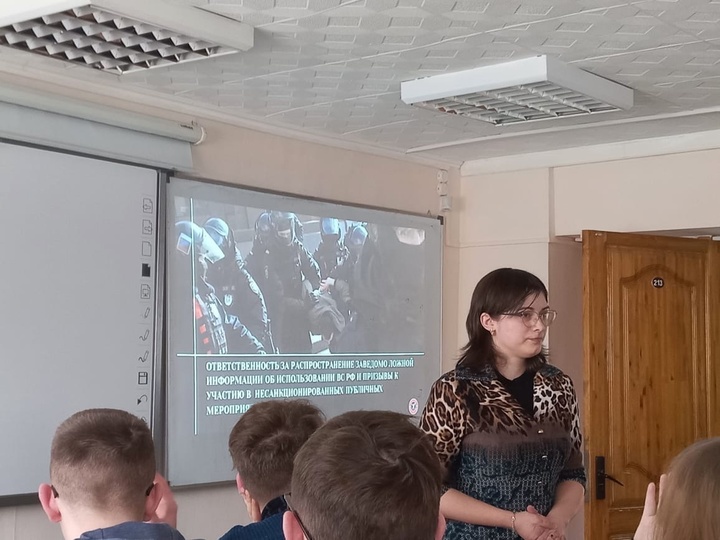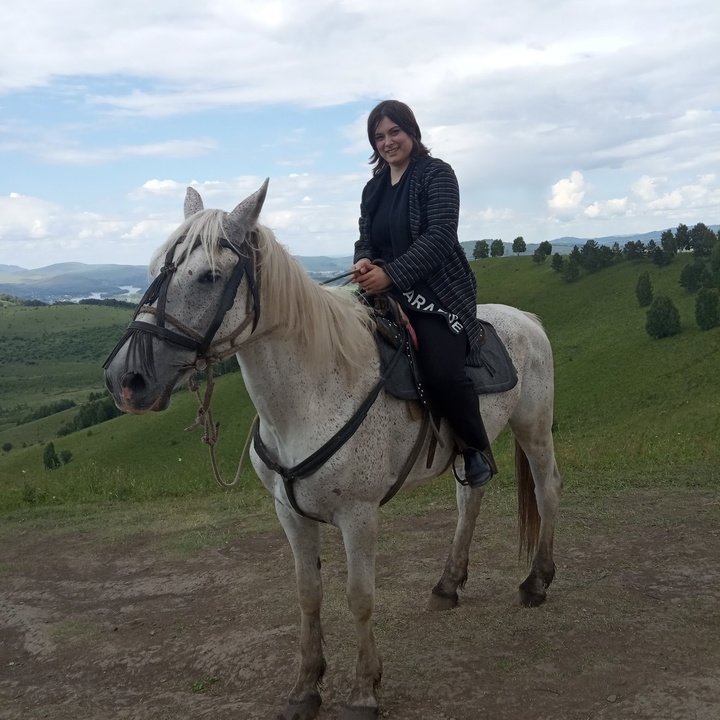A writer from Barnaul headed the anti-terrorist center
[ad_1]
– Maria, tell us, where did you study to become an investigator? How did you come to the profession as a little girl and suddenly decide: I will grow up and solve crimes?
– I studied and still study at the Law Institute of Altai State University. From my second year, I started my practice in the investigative department as a public assistant. For the most part, in practice, I had to work with documents – materials of pre-investigation checks). But since childhood, I dreamed of devoting myself to the fight against terrorism, so simple investigations were not enough for me.
– When did you write the works? Were there any plans to follow the path of Marinina, who went inside the system of the Ministry of Internal Affairs and became the coolest author of detective stories.
– I wrote my first works in elementary school. My stories and novels were very personal for me from the very beginning, and at some point I realized that it hurts me enough to touch on many personal topics. And yes – I tried to work in the detective genre, but in literature I am more attracted to lengthy descriptions of the situation and events than intrigue.
– During the investigation, did you personally solve the crimes? Did you have to take fingerprints? To find the killer by the only hair that fell from his head, to catch maniacs…
– In 2017, I worked as a public assistant, I didn’t have to be an investigator directly. Of course, I’ve been out and about. In practice, there was a rather interesting disclosure of the murder – it was my very first experience.
I did not take fingerprints, although, of course, I know the technique, but this is done by a forensic expert, who always acts in tandem with the investigator. Maniacs did not have to be caught, the most common practice was fights and thefts, sometimes molestation of minors. And, of course, drugs.
– Can you tell me more about this disclosure?
– The essence of the matter was something like this: a man and a woman went out of town to practice shooting and he shot her in the line of fire. In principle, there was no particular mystery here, the suspect was detained “in hot pursuit.”
– The suspect did not evade and deny guilt?
– He confessed confessed immediately, the only thing was that they were looking for a weapon for a long time, since he said that he threw it into the river.
– In this case, you immediately showed yourself capable of the profession?
– Experienced investigators, I remember, I struck with efficiency and insensitivity. I was once told that at the first exit they expected me to faint at the sight of a corpse, and not climb to study it in all its details. It was difficult for me to conduct surveys, since I am an introvert by nature and, in general, are reluctant to communicate. However, now it doesn’t bother me anymore, at the university I have to communicate with a hundred people a day.

– Were there any complicated and non-standard cases?
– I do not, but a peculiar case once happened in the practice of my senior comrades. “Realizing the intent to commit indecent acts” (here in the conversation, Maria unexpectedly switched to protocol language, – I.V.), the criminal lured a girl into the forest belt and, threatening her with a knife, demanded to undress in front of him. He placed the knife on the ground next to him. The girl was not taken aback and stabbed him.
– How old was this courageous child?
– About eight years at that time, if I’m not mistaken.
Returning to the detectives, tell me, how do you get acquainted with the reading material about the world of crime? Doesn’t the investigator’s indignation begin to boil on the first pages: “What nonsense is written here, we don’t work like that!”.
– I often read special legal literature, but, yes, sometimes detectives come across. This is interesting enough. However, I can immediately say that, as they show in the eternal series “Trace”, the investigative structures do not work, and shootings are infrequent. The main weapon of the investigator is a pen and a computer for printing reports and protocols.
– And how did you fight the drug trade?
– I acted as an attesting witness during the searches for narcotic crimes. These are usually rather monotonous options: searching for “bookmarks” in snowdrifts and sandboxes, searching for stocks of “goods” in apartments. Now popular, unfortunately, the distribution of drugs through the Internet.
– Then immediately the question is: did the “inventive” dealers meet – or were all their homemade “hacks” templated and “clicked” by the police like nuts?
– There was a curious case: they came with a search to one leader, and his entire shed turned out to be filled with dried hemp bushes. Enough for a whole store, but the ward swore that the supply was made for his own use. And for hiding places, they are mostly found quite quickly, the only problem is that they come across lower levels – “couriers” and “mortgager”, and it is less possible to stop the activities of the organizers
– Maria, tell me, do you already have a rank, a service weapon? Are you recognized on the street as a security officer (say, by uniform)?
– I don’t have a service weapon and never had it. I had to shoot only in an amateur shooting range – my eyesight is not very good, but I got into the top ten. I don’t have a title. They don’t recognize you on the streets. I don’t have a uniform – a purely civilian style of clothing
– And when did you start anti-terror?
– Since 2016, when she organized the student anti-terrorist squad “Anti-extremism” on the basis of her native faculty. At that time, it was the first in the Altai Territory and one of the first associations in Russia where students who had undergone psychological training were engaged in the prevention of terrorism. Then, already in 2020, I moved to the Regional Anti-Terrorist Scientific and Methodological Center, which was then created on the basis of the Law Institute, and since 2022 I have been heading it. Such centers are far from being everywhere; at the time of its creation, it was practically the only one beyond the Urals. But since this year, similar structures have already been created in 23 universities by decision of the Russian Ministry of Education and Science and the National Anti-Terrorism Committee.
– What is the mission of the AC?
– Our work is divided into two areas: prevention (legal education, informational conversations with schoolchildren and students) and detection (direct search for persons potentially inclined to carry out terrorist activities).
– “Legal education” is a cold clerical phrase. What living process is behind it?
– We are trying to clearly show what terrorism is and what punishment will follow for engaging in such activities or facilitating them.
– Is it also your task to prevent the appearance of new shooters – “Kazan”, “Kerch”?
– We constantly keep a record of such cases, analyze the factors that led to the incident, train students and teachers on how to act in such an emergency situation. We give advice on the triad “Run – hide – fight.” I always give one piece of advice: if possible, always run. If you can’t run away, hide. And only in extreme cases, risk discovering yourself.
– Are they really trying to recruit Russian children on the Internet?
– Yes, there were such cases.

– Okay, but if a child or teenager encounters recruiters, what should he do? Call the police or the FSB?
– Of course, the hotline works continuously. However, if there are fears that recruitment is taking place, parents should first contact the curator or class teacher, and he will turn to the school psychologist or social pedagogue. We have been working with them for a long time and fruitfully, a response system has been established there.
– Was there a kind of “shock meeting” with children in your practice? In general, are young Russians law-abiding?
– Practically at every meeting there are schoolchildren and students who actively disagree with us. Often it comes almost to the point of screaming. Of course, we attribute their emotions to youthful maximalism, but we always put such guys under control and work with them separately.
– How do they treat adults, and even more so, people in uniform who come to the classroom / audience?
– It also happens that negatively, they consider “resistance to propaganda” their goal. However, there are those who are interested, who listen carefully. We’re looking at those too: the quiet listener may have already been recruited and trained to hide emotions and control himself.
– That is, the remoteness from the Caucasus and the Middle East does not save Altai?
– The Altai Territory borders on Kazakhstan, and it can be unsettled here. In addition, the region is very different. Where Barnaul is located, for example, Christianity is predominantly widespread, but Islam is also found. And in the neighboring Republic of Altai (this is where the mountains are, we don’t have them) Burkhanism feels great – a form of shamanism, that is, paganism. It should be noted that studying the interaction of religions is also very interesting.
– “Sleeping” and “non-sleeping” cells – do the population perceive them as an actual threat? Sometimes it seems – put a suspicious box in the middle of the square – and no one will notice.
– It’s just that now they are not mentioned so often in the media. “Sleeping cells” are real and are constantly working among young people. And the fight against terror is ongoing, and educational institutions are an important front in it.
– But many “relaxed”?
– Not that they relaxed, they rather believe that this will not affect them.
– How do you work – we understand. How do you rest? And when do you write?
– Now, fortunately or unfortunately, work prevails, and many aspects of my work will probably be boring for creativity. Previously, while maximalism splashed in me, I really liked to fill the plots with blackness, and now, when you see it almost every day, you want to read or write more about something bright or even fantastic. Here is such a peculiar connection between work and creativity: at work you have to be a Terminator, and at home you watch the Lord of the Rings marathon.
At the moment, my main Magnum opus is a dissertation for the degree of candidate of legal sciences, which I really hope to defend.
– On your pages in social networks there are photos on horseback, somewhere far away in the steppe. Is outdoor activities your hobby?
– I usually have active rest in half with work – I have to go on business trips to various forums and conferences, and in between meetings I rush to go around all the local attractions. And I have been fond of horse riding since 2014, I also like to participate in excursion horse routes in the mountains. But the main hobby is still books.
[ad_2]
Source link






